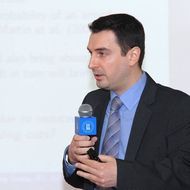- A
- A
- A
- ABC
- ABC
- ABC
- А
- А
- А
- А
- А
- HSE University
- Faculty of Economic Sciences
- Department of Theoretical Economics
- Events
- Department of Theoretical Economics Research Seminar with Postgraduate Student and Assistant Vladimir Schukin, HSE
-
Department
109028, Moscow,
Pokrovsky Boulevard 11, Rooms: S1029, S1030
Phone: +7 (495) 772-95-90*27172, 27173, 27174
The Department of Theoretical Economics brings together highly qualified specialists in various fields of economics, including micro and macroeconomics, monetary and financial theory, economic history and the history of economic thought. Our mission is to teach economic disciplines at HSE on the level of leading Western universities.
Dranev Y., Miriakov M., Ochirova E. et al.
Journal of Corporate Finance Research. 2024. Vol. 18. No. 1. P. 5-19.
Olga Demidova, Elena Kayasheva, Artem Demyanenko.
In bk.: Eurasian Business and Economics Perspectives: Proceedings of the 38th Eurasia Business and Economics Society Conference. Vol. 25. Springer Publishing Company, 2023. Ch. 13. P. 209-232.
Tabashnikova D., Sandomirskaia M.
Economics. EC. Высшая школа экономики, 2023. No. 263.

Department of Theoretical Economics Research Seminar with Postgraduate Student and Assistant Vladimir Schukin, HSE
Department of Theoretical Economics invites you to attend the research seminar with Postgraduate Student Vladimir Schukin, HSE
Date: May 26, 2020
Time: 1:40 p.m.
Working language: English
Speaker: Vladimir Schukin, Postgraduate Student of the Department of Theoretical Economics
The link to Zoom: https://zoom.us/j/96772969416
Title: "Clientelism and development: Vote-buying meets patronage"
Abstract: Offering employment in the public sector in exchange for electoral support (patronage politics) and vote buying are clientelist practices frequently used by political machines. In the literature, these practices are typically studied in isolation. In this paper, we study how the interaction between these two practices (as opposed to having just one tool) affects economic development. We present a theoretical model of political competition, where, prior to election, the incumbent chooses the level of state investment which can improve productivity in the private sector. This decision affects income levels of employees in the private sector, and, thereby, the costs and effectiveness of vote-buying and patronage. We show, that when the politician can use both clientelist instruments simultaneously, his opportunity cost per vote secured declines because these tools can complement more than substitute each other. Furthermore, if rents to office is sufficiently high, the equilibrium level of state investment also declines.
- About
- About
- Key Figures & Facts
- Faculties & Departments
- International Partnerships
- Faculty & Staff
- HSE Buildings
- Public Enquiries
- Studies
- Admissions
- Programme Catalogue
- Undergraduate
- Graduate
- Exchange Programmes
- Summer University
- Summer Schools
- Semester in Moscow
- Business Internship
-
https://elearning.hse.ru/en/mooc/
Massive Open Online Courses
-
https://www.hse.ru/en/visual/
HSE Site for the Visually Impaired
-
http://5top100.com/
Russian Academic Excellence Project 5-100
- © HSE University 1993–2024 Contacts Copyright Privacy Policy Site Map
- Edit






